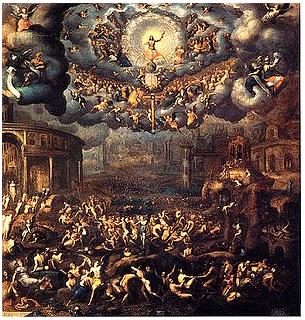Jesus of Nazareth
Most Christian denominations venerate him as God the Son incarnated and believe that he rose from the dead after being crucified. The principal sources of information regarding Jesus are the Bible's four canonical gospels: Matthew, Luke, Mark and John. Most critical historians agree that Jesus was a Galilean Jewish Rabbi who was regarded as a teacher and healer in Judaea, that he was baptized by John the Baptist, and that he was crucified in Jerusalem on the orders of the Roman Prefect, Pontius Pilate, on the charge of sedition against the Roman Empire. Critical Biblical scholars and historians have offered competing descriptions of Jesus as a self-described Messiah, as the leader of an apocalyptic movement, as an itinerant sage, as a charismatic healer, and as the founder of an independent religious movement. Most contemporary scholars of the historical Jesus consider him to have been an independent, charismatic founder of a Jewish restoration movement, anticipating a future apocalypse. Other prominent scholars, however, contend that Jesus' "Kingdom of God" meant radical personal and social transformation instead of a future apocalypse. Christians traditionally believe that Jesus was born of a virgin, performed miracles, founded the Church, died sacrificially to achieve atonement, rose from the dead, and ascended into heaven, from which he will return. The majority of Christians worship Jesus as the incarnation of God the Son, and "the Second Person of the Blessed Trinity". A few Christian groups, however, reject Trinitarianism, wholly or partly, believing it to be non-scriptural. Most Christian scholars today present Jesus as the awaited Messiah promised in the Old Testament and as God, arguing that he fulfilled many Messianic prophecies of the Old Testament. Judaism rejects the belief that Jesus was the awaited Messiah, arguing that he did not fulfill the Messianic prophecies in the Tanakh. In Islam, Jesus (Isa) is considered one of God's important prophets, a bringer of scripture, and the product of a virgin birth, but not the victim of crucifixion. Islam and the Bahá'í Faith use the title "Messiah" for Jesus, but do not teach that he was God incarnate.
Jesus didn't say that. The important message from Jesus is: “Love Your Neighbors, as You Would Love Yourself” (Love Law II). Also, "Seek and you shall find" (Matt. 7:7 - spiritual discovery). The Holy Grail was not the cup that Christ drank out of, it was a cup of knowledge, Most of Jesus messages are ethereal, metaphysical and practical. Ethereal and metaphysical words were ruled out. "Enter into your own heart and you will find salvation and happiness." With knowledge people are brought to their own level of salvation. Salvation really means saving yourself to get back to 'The Other Side' intact. To save yourself from ignorance, from the addictions, the hurts, the Darkness. To not get earthbound (Lower Mind); to not reside in the body, but above the body. And not because you want to believe in Christ or God or the Holy Spirit (they are going to believe in you). Salvation should mean 'loyalty', not saving. If someone does not believe in God it does not mean they are not going to be saved. God's loyalty is continuous and ongoing. One's loyalty to God elevates you and makes your life easier, where things will not hurt or bother you. “He’s going to come back to avenge the wicked, right? Jesus was a direct report from God. A very special human being sent to Earth to enlighten mankind. In her New York Times bestseller, ‘Beyond Belief–The Secret Gospel of Thomas’, Elaine Pagels, Professor of Religion, Princeton University, discusses the conflict between John and Thomas, “From the Gospel of Thomas: Jesus said: "If
you bring forth what is within you, what you bring forth will save you. If you do not bring forth what is
within you, what you do not bring forth will destroy you.” "And Mary said: 'My soul doth magnify the Lord'" (Luke 1:46) Our Lord will not return for various
reasons:
z |

